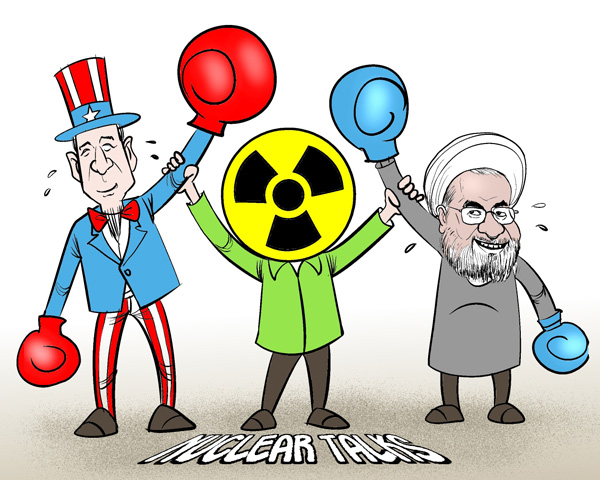The Iran nuclear issue: three scenarios
- By Jin Liangxiang
 0 Comment(s)
0 Comment(s) Print
Print E-mail China.org.cn, February 1, 2014
E-mail China.org.cn, February 1, 2014
|
|
|
Nuclear talks: Round ? [By Jiao Haiyang/China.org.cn] |
The Iran nuclear issue on January 20, 2014, entered the implementation phase of the "Joint Plan of Action," also referred to as the interim agreement, which certainly spells good news; but despite the optimism, obstacles remain omnipresent. Whether the United States will be able to remove its sanctions on Iran's oil and financial sectors, marking Iran's core concerns, is just one of them; and judging by the difficulties on the U.S. part, the prospect of the Iran nuclear issue remains complicated. U.S. Congress is now in fact discussing the installment of new sanctions on Iran instead of the removal of those currently in place.
The question then remains, how will things unfold? Here follows a sketch of three possible scenarios.
The first scenario will be that the United States and Iran maintain the status quo on the basis of the interim agreement. In this case, the interim agreement cannot be implemented as a result of U.S. Congress either passing new sanction bills or not being able to remove a substantial part of the existing sanctions on Iran's oil and financial sectors. Yet both sides are either still willing to interact according to the principles and spirit of the interim agreement or they will extend the agreement to a designated term. In other words, Iran will still honor its commitments, including freezing its efforts to advance the country's nuclear capabilities and keep its nuclear program and activities necessarily transparent. In return, both the United States and European countries will freeze the sanctions.
This first playbook should make an acceptable option for both sides, though neither side is 100 percent satisfied as both possess strong home front forces that oppose any reconciliation between the two. In this scenario, the United States can make sure that Iran's nuclear program is not diverted for military purposes in the predictable future, while Iran can seize the opportunity of détente to improve relations with both its neighbors and several European countries.
The second scenario will see further substantial concessions on Iran's part in exchange for some incremental concessions on the U.S. side. That is to say, Iran is also willing or has to accept the outcome, even if the United States does not remove the sanctions on its oil and financial sectors. The nation must also be fully aware that it has no other choice -- judging by the current comparison of power. In this situation, Iran might keep its uranium enrichment capability at 5 percent purity, give up its rights to enrich uranium with higher purity and cooperate with IAEA regarding regular inspections. Obama's government, with presidential authority, removes the sanctions on Iran's oil and financial sectors for 240 days, according to the relevant bills altogether, and ease other sanctions as well.







Go to Forum >>0 Comment(s)